张保红——文学翻译分析
张保红文学翻译PPT课件
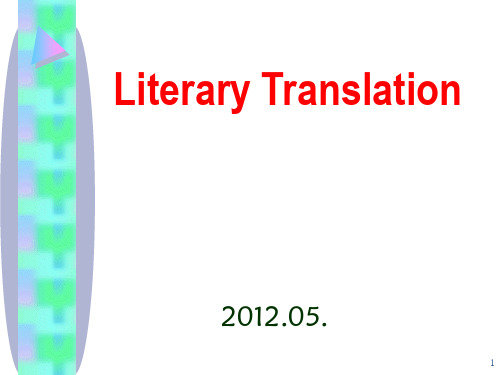
9
• 重译: • 西海的风啊, • 你轻轻地吹,轻轻地唱 • 西海的风啊, • 你轻轻地,轻轻地吹呀唱, • 越过波涛翻滚的海洋, • 掠过明月西沉的夜空,吹呀 • 再把他吹到我的身旁; • 我的小宝宝,我的乖宝宝,睡呀睡得香。
2 A Call on the Recluse Who Is Just Out
3
--- tr. Sun Dayu
3 A Hermit Visited but not Encountered
4
--- tr. Wan Changsheng & Wang Jianzhong
4 Looking for a Recluse but Failing to Find Him
11
• 译文: 一个刚从学校回来的年轻女士正 在解释。“拿一个鸡蛋,”她说, “在底部打一个孔,在顶点上打 一个相应的孔。然后把嘴唇放在 孔上,用力吸气,蛋壳里的东西 就会完全抽空了。”一个听她讲 的老妇人惊叫道:“如今的人做 事真奇怪,我作小孩的时候,他 们一头打个洞,就吸干了。”
12
• 译文: 一位刚从学校回家的女学生正在解 释:“取一枚鸡蛋,”她说,“在 蛋的底部打一个小孔,再在蛋的顶 点上打一个对应的小孔。然后将嘴 唇置于该孔之上并用力吸气,壳内 之物则尽释无遗。”一位听她讲话 的老太太嚷了起来:“如今的人做 事真叫人摸不着头脑,我作姑娘的 那阵儿,人们把蛋一头磕一个洞, 嘶溜儿一嘬就吃了。”
3 真实指涉性(真值性)VS 虚假指涉性(虚指性)
6
1. 文学语言的自指性:
第六小组 终版

高昂亢奋 开始爆发
7,000,000 Dutch men, women and children will want to be there to curse him during his dying moments.
A plebiscite was taken as to whether this was a fitting punishment. There was 4,981,076 yeas and one nay. The nay was voted by a man who preferred that Hitler be pulled to pieces by four horses.
可以看出人们似乎失去了“理智”,希特勒很 残暴,但是人们处死希特勒的方式似乎比
希特勒还要“残暴”,有强烈的讽刺意味。
故事情节
结构 开端 发展 高潮 结局
故事情节 讨论死刑 投票决定 执行火刑 火刑停止
段落 1-3 4 5-9 10-14
二、作品概述
从以上对文章的背景、人物、情节的分析,我们可以看 出,这篇文章文字浅显流畅、通俗易懂,故事情节跌宕起 伏,环环相扣,人物形象鲜明,字里行间都能体会到人们对 希特勒的仇恨。但是从群众处死的方式中,我们也可以感受 到强烈的讽刺意味。
➢此时作者笔下的民众深受希特勒迫 害,家破人亡,作者的描写体现了 对饱受战争之苦的人民的同情。
三、原文审美鉴赏
三、原文审美鉴赏
(一)节奏美 (二)语义美 (三)修辞美 (四)形象美
(一)节奏美
节奏美,除了表现在声调的轻重缓急,句子 的长短整散等语言构成的外在形式节奏上,还表 现在情绪自然消长的内在节奏上。
(张保红,2011:142)
论英诗中分行的功能及其在诗歌翻译中的应用

论英诗中分行的功能及其在诗歌翻译中的应用
张保红
【期刊名称】《天津外国语大学学报》
【年(卷),期】2005(012)003
【摘要】分行是英诗区别于其他文学作品的鲜明的外部特征.英诗的分行并不是随意的,而是颇富理据性的.通过若干诗例探讨了英诗分行的七种主要功能和其美学效果及其在诗歌鉴赏与翻译研究中的功用.
【总页数】7页(P6-12)
【作者】张保红
【作者单位】中国地质大学,外语系,湖北,武汉,430074
【正文语种】中文
【中图分类】H315.9
【相关文献】
1.汉英诗歌翻译中的意境转换 [J], 李翠娟
2.论庞德汉英诗歌翻译中的意象再现 [J], 张璐璐
3.汉英诗歌翻译中的形式对应 [J], 任晓霏
4.浅析奈达功能对等翻译理论在诗歌翻译中的应用——以周建新译《艾米莉·狄金森诗选》1-300首为例 [J], 宋晓庆;
5.\"三美\"原则和功能对等理论在英语诗歌翻译中的应用——以《当你老了》的翻译对比为例 [J], 李立云
因版权原因,仅展示原文概要,查看原文内容请购买。
张保红文学翻译小说英译汉作业

方明明文学翻译小说英译汉从土耳其来的侄儿伊利亚斯·哈里尔著去年的一天,突然响起了敲门声。
我的侄儿没打声招呼就从土耳其来了!我上一次见他时,他才到我膝盖,像蚱蜢似的小不点儿,长了一双怯生生的眼睛,两只像一双扇子的耳朵,没了俩门牙,头发短短的,和永远脏兮兮的手。
你知道,每一个侄子基本都长这样儿。
我喜欢这孩子,对他很钟爱。
用他那小不点的身高,他总是仰脸瞅着我好似在看一根电话线杆子,他的大眼睛笑着总能把我逗乐。
从短裤里露出的两条腿有点罗圈腿。
两只眼睛虽然直视着你但有点斗鸡眼。
我看着他的时候有点怜惜他······所以我从来没有对他发过火也没有打过他。
我俩说话时,他肩膀上好似放的有重重的东西,表现出防御的样子。
他要是犯错了,这个特点会更明显。
他的眼睛渐渐湿润,声音小的都听不到;颤抖的像一片叶子。
谁看见他都会以为他是一个孤儿会为之难过。
他们就想给他点儿钱或是一些糖果。
因为一些事我打过其他的侄子,但是从来没碰过他一根手指头。
我爱他还爱不够呢!在家时,不管谁惹大人生气了,我的这个小侄儿都能让自己离得远远的。
要是你跟他说话,他就不回答。
如果他回答了也是声音小小的。
你就是打他他也是安静的。
挨打的时候,叫的声音不是越来越大,而是逐渐降低。
因此,打他的那个人怒气会变成同情,于是这小男孩就逃过了更多的惩罚。
我是很久之后才总结出来,他跟其他人说话时,既不会罗圈腿也不会斗鸡眼耳朵更不会像飞落的叶子。
还有,他生气的时候,他知道怎样吵个不停。
要是他知道危险临近(要挨打了)他就会罗圈腿、斗鸡眼、耳朵拉长。
我移民加拿大之后有十五年没见到侄儿了。
现在他已经长成魁梧的大小伙儿了,英俊健壮!表示欢迎之后,我问了他一些问题,想知道他来这里的原因。
“侄儿,你想找什么样的工作啊?”“啊,蒙主的恩准,叔叔,我愿干任何的工作。
我什么都能干。
只要说得出来我就能干。
我什么都干过。
干过木匠、电工、货郎、修鞋匠、裁缝、汽车修理工;您还要吗?这些我都干过。
文学翻译的学思用

2023·02 英语世界
看形式结构,就是看句子或篇章的外在形式与内在构成。是长句还是 短句;是倒装句、强调句还是掉尾句(periodic sentence);是片段句(fragmented sentence)还是完整句;是简单句、复合句(compound sentence)还是复杂 句(complex sentence);是主动句还是被动句;是定语从句、状语从句还是 同位语从句;等等。了解句子的外在形式,辨明句式及句间关系的功能、作 用与价值,目的是要获得其传达的意义或语用意义。看句子的内在构成可 进一步了解其修辞特点、运思方式与文化蕴涵等,是进一步了解意义传达 的方式特色与深度。看篇章的外在形式,是看篇章“长什么模样”,即语言 学上所说的“语相”。俗话说:相由心生。篇章的外形相貌尤其是形体诗 (shaped poetry)、图案诗(pattern poetry)、具象诗(concrete poetry)等诗歌 作品的外形相貌与作品中心主题的表达可谓相辅相成、相得益彰。看篇章 的内在构成,是看其谋篇布局是先总起后分述,还是彼此并置,平行发展; 是起承转合,还是开合收放;等等。
英语世界 2023·02
122 学苑
学作品的常态。在此意义上,探寻作品字里行间的意味,发掘作品多维多 层的主题意蕴,聚焦作品定向统一的深邃意境,成为学习者致力于把握作 品的根本目的。至此,我们可以归结说前文所提到的声音、节奏、形式、 结构、意义、意味、意蕴等要素最后会以多角度、多侧面、多层次的方式 定向统一服务于作品的意境表现。
学苑 121
文学翻译的学思用
文 / 张保红*
听声音节奏,看形式结构,想意义意味意蕴意境,是我教授文学翻译课程 时总结的文本分析与评价口诀,其目的是便于上口好记,当然更主要的 目的是给初学者提供一个如何分析原文或表达译文的“通俗”思路与方法。
文学翻译的学思用(三)——破“译”精彩的密码

话。合格的译者可以做到双语转换,而好的翻译家能够做到与作者心灵上的
沟通。译者的用笔犹如一列磁悬浮列车,既没有亦步亦趋地贴在原作的文字
上,却又飘然自得地运行在作者心灵的轨道上。
□
2024·01 英语世界
学苑 113
臻此境的喟叹,甚至笃信这样的译例只可鉴赏远观,亲自实操很难。而加 深这一“信念”的还有平常所见到的套语式译评分析:译文读起来文从字顺, 朗朗上口,形式整饬,节奏优美,用词精到,意蕴豁然,给人以美的享受。 这类译评广义来说固然适切,但常常让人知其然而不知其所以然。因此, 如何走近精彩的译例,破解其中的密码,以备来日不时之需,这是我们需 要直面的话题。且引一例如下,试作演绎,就教于方家学人,相互切磋, 共同提高。
其最后所演绎出的是整齐中有变化、变化中有统一的审美节奏。从思维方
式看,原文先说结果,后说引起结果的种种现象,而译文先说现象,后说
由种种现象导致的结果,这是中西思维方式上的差异,上引译文的译者深
谙此道,前后腾挪,彼此调换,自然得体,恰到好处。至此,从语义的准
确到语言的质感,从节奏的建立到运思方式的转换,译者走完了自己的再
It was a day as fresh as grass growing up and clouds going over and butterflies coming down can make it. It was a day compounded from silences of bee and flower and ocean and land, which were not silences at all, but motions, stirs, flutters, risings, fallings; each in its own time and matchless rhythm. (The Vacation)
毛泽东诗词英译评析

毛泽东诗词英译评析外语与翻译2004年第1期(总第40期)毛泽东诗词英译评析张保红中国地质大学[提要】本文从风格,选词,意象,神形兼似以及再创造等角度对毛泽东诗词的不同译本进行了比较性的赏析研究,旨在为诗译,诗评提供多个可资借鉴的视角.【关键词】毛泽东诗词,翻译,赏析毛泽东诗词的英译为数不少,就笔者所知达十三种之多.众多的译本为我们提供了丰富的学习材料,同时也为诗歌翻译研究带来了诸多具体而生动的实例.本文以毛泽东诗词荚汉比读为经,以其鉴赏批评为纬,举隅数端来探析毛泽东诗词英译的艺术成就.1,风格的再现通常探讨某部作品的风格或与之相应译作的风格,除从风格的精神实质即作者的人格志趣来分析外,往往更多地借助构成风格的物质要素来考察,也就是从语言上来分析作品的音韵节奏,选词造句,篇章结构,修辞手段的种类和使用频率等.不言而喻,作者的风格,作品的诗义与诗趣是通过构成作品的诸多物质要素浑融一体地显现出来的.因此,翻译实践中,再现原作的风格不仅要考虑到作者的人格志趣,更应考虑到将作者的人格志趣与构成作品风格物质要素的具体内涵统一起来.因为只是看重作者的人格志趣,从宏观上来看可能转存了作者的风格,使译作与原作谋得了风格上的大体相符,但在某些具体的语境下却会使作者的人格志趣与构成作品风格的物质要素的具体内涵不能协调一致,从而有损原作意蕴的传递与再现.我们知道,作者有作者的风格,译者有译者的风格.张今(1987)将文学译品的风格大体归纳为五种境界:1)只有作者风格, 看不到译者风格,这种境界事实上是不可能的;2)作者的风格与译者的风格浑融一体, 这是上乘译品的境界;3)作者风格与译者风格平分秋色,这是中上乘译品的境界;4)看不到作者风格,只见译者风格,这是下中乘译品的境界;5)既看不到原作者的风格,也看不到译者的风格,这是下乘译品的境界. 由此可见,理想的情形是译者的风格无论在宏观上还是在微观上应与作者的风格浑成一体.任何有意识或无意识突显译者的风格都或多或少会损及或改变原作意蕴与风格的再现.那么,毛泽东诗词的风格在诸多译本中的再现情况是怎样的呢?且看以下诸例:(1)原文:六盘山上高峰,红旗漫卷西风. (清平乐~~tth)译文①OfSp~-alMountainatthecrest, Redflagswaveinwantonwindsfrcxnthe--tr.XuYuanchong译文②OnMountLiupan,nay,onitsverycrest, Redbannersplayinbreezesfrownthewest.--tr.ZhaoZhentao这首词是毛泽东在长征途中翻越最后一座雪山——六盘山时的咏怀之作.上文是该词下阙的首联,该联抒发了红军胜利登25外语与翻译2004年第1期(总第40期)上六盘山的豪迈气概.从该联中"红旗漫卷西风"一句里"漫卷"一词所营造出的随意舒展卷起的形象,可以见出其时诗人的心情是尤为轻松欢畅的.我们知道,"毛泽东诗词是偏重于豪放的,其意豪,其象大,其气雄." (马连礼等2000:139)从这个角度来看,译文①"wanton(winds)"的措词似不为过,但这一措词具体到这里则改变了"红旗漫卷"可折射出的创作主体特有的意味.相比之下, 译文②对该句的处理就比较稳妥,景中含情,字词间体现出了诗人的那份轻松,欢畅与惬意,与原文风格取得了宏观与微观上的一上文提到译者风格与作者风格的问题,下面我们来看看译者风格在译文中的体现及其与作者或作品风格的关系.为了便于分析,也因限于篇幅,我们只选取部分原文及其英译文为例来比较阐释.(2)原文:天连五岭银锄落,(送瘟神其二)热风吹雨洒江天.(4z律登庐山)洞庭波涌连天雪,(七律答友人)风雨送春归,(卜算子咏梅)参天万木,(念奴娇井冈山)重比翼,和云翥.(贺新郎)译文①黄龙的相应译文:(相应译文按顺序标出,下同) Ontheheaven—kissingFiveRidgesfallthe mattocksofsilver;Onthesky-kissingwatersthehotnd sprinklesrains.DongtingLake'ssurgesrollupsk3ukissing SnOWasitbeseems.Windandraink/ssedoffSpringwitha"good—bye",Myriadsoftim~.rskissingthefirmament Andsoarabreastwithfleecycloudskissing thesky.译文②许渊冲的相应译文: Onfivesky—scrapingRidgesOurhoesshine silver-bright; WarmwindssprinkleraindropsOnmirrorsofthesky.Dongting'Swavessurgelikesnowtolevel skyandlake; Thenspringdepartedinwindandrain;Sky-scrapingtreesThenliketwobirdswe'llny. Andcleavethecloudsonhigh.译文①中的斜体部分表明:"kiss"一词在不同诗句的译文里一再使用.汉英两文比照,我们不难意识到这是译者的措词特色或风格.仅从其表象来看,"kiss"一词的不断使用既显单调,也不符合毛泽东的个人风格或语言风格;原文诗句依情转意,意象鲜活,意境摇曳多姿,而译文千篇一律,尤显刻板,极大地消解了作者的创造性与原文诗句的艺术性.译文②随情转意,造语鲜活,意象间相互有别,都凭着自己特有的生命而生活着,较好地再现了诗人语言的艺术性与创造性.又如:(3)原文:踏遍青山人未老,(清平乐会昌)马蹄声碎,(忆秦娥娄山关)夏日消溶,(念奴娇昆仑)欲与天公试比高.(沁园春雪)已是悬崖百丈冰,(卜算子咏梅)炮火连天,弹痕遍地,(念奴娇鸟儿问答)译文①黄龙的相应译文:We'vetroddenallovergreenhillswithoutthe slightestse/xseofageanddecline,CrispandbrisksoundstheclatterofhorseInsurl'Lrnerdaysallthawandmeltaway, BothtDngtOoutrir~anddu~rfHeavenin height.Defyinghundred-zhang-longiciclesoverhanging thecliffsheerand^ Bycslqnonfiretheheavenisrentandshocked, Thewholeglobeshe//一scarredandbullet-pocked, 译文②许渊冲的相应译文: Wehavetroddengreenmountainswithoutgrow. ingold.SteedstrotwithhoovesoutwornWhensunm1ermeltsyourSnOW外语与翻译2004年第1期(总第40期) Alltrytomatchtheskyinheight. Thoughiciclesfrombeetlingcliffsstillhangmiles long,Withgunfiretheskyisloud Andbyshellstheearthisscarred;从译文①中的斜体部分我们可以看到,译者对原文中加点字词的翻译是细腻而深刻的.这样深挖原词句内涵在予人多角度同向审美感受之时,也有助于题意的渲染与揭示.然而,从毛泽东诗句翻译的整体来看,如此众多的译法遍布其间,无疑会消解毛泽东诗词简洁凝练的风格,拖沓其雄健有力的节奏,让读者难以看到毛泽东诗词风格的真面目.相比之下,译文②选词用字简洁凝练,干脆利落,既转存了原文鲜明的节奏,又再现了毛泽东诗词的精炼文风.再如: (4)原文:龟蛇锁大江.(菩萨蛮黄鹤楼)更加众志成城.(西江月井冈山)西风烈,(忆秦娥娄山关)莫叹韶华容易逝,(七律和周世钊同志)高路入云端.(水调歌头重上井冈山)白云山头云欲立,(渔家傲反第二次大"围剿")译文①黄龙的相应译文: TortoiseandSnake/ockupthegreatriverl/ke achain.Furthermore,1/keabronzezt~zllourhearts fuseandunite. Thewestwindstingslikeabite, Lamentnotovertheevanesceneofyouthful springtide1/keainthepan, Mountingroadspiercingthecrestofclound1/kealance. Cloudswouldbristleupwithwrathonthe summitofMt.WhiteCloud.译文②许渊冲的相应译文: TortoiseandsnakeholdtheRiverinchain. Ourranksasfirmasrock, Ourwillsformanev~wal1. Thewildwestwindblowsstrong; DonotregretOLlrgoldenhoursofdaysgone by!Andcloud—cappedroadsleadtothesky. AtoptheWhiteCloudMountaintheclouds seemtorear;上列原文各句语言平易浅近,意义简明易懂.译文①相应的译文均以比喻译出,这在一定程度上有助于渲染原诗的诗意,但其比喻多流于陈腐的俗套,缺乏生动鲜活的因子.同样地,从毛泽东诗词英译文的整体来观照,如此众多的陈辞充斥其间,译文读者是难以看到诗人语言运用上的创造性与艺术性的,甚至会得出这位独步古今的诗人只是徒有虚名的错误印象.而译文②则没有过多的主观藻饰,译语统观全局,悉依原文. 精炼鲜活,较好地传达了原文简明的风格. 2,译词,译意,译昧诗歌语言字句凝练,言简意赅,它想象丰富,形式独特,如音乐般动听,被称为"带有音乐性的思想".诗歌语言的这些特征使它有别于日常普通语言,所以翻译诗歌语言时,不能只做到以"词"译"词",即传递信息, 还应做到以"词"译"意",即传情达志;更应尽力做到以"词"译"味",即在再现原作气势与效果之时,能激发读者的想象,活跃读者的思维,使其得到美的享受.诗歌中字句的翻译之所以要如此,具体来讲,是因为诗歌中的字句是诗人传情达志最为基本的载体. 是营构诗作整体意蕴氛围的一分子,所以一旦剥离了诗歌中字句与诗人情志,诗作整体意蕴氛围的关系来翻译,译文的表现力与艺术性必然会大为逊色.例如:(1)/g文:不管风吹浪打,胜似闲庭信步. (水调歌头游泳)译文0)Letthe,vindblowandWaV esswill. Tome,itsbetterthanhavingastroll Inacourtyardatwil1.--tr.GuZhengkun译文②Inwindsandbillows,highasthey maybe,27外语与翻译2004年第l期(总第40期) Betterthanidlypacingquietyards,——廿.ZhaoZhentao译文③ignoring,Jl,ind'sblowingandwaves' beating:betterthanwalkingslowly inthequietcourtyard.一廿.Hua-lingNiehEngle&PaulEngle 译文④Bravingwildwindsandwaves,Ifeel rn0repleasure Thanstrollinginayardatleisure——廿.XuYuanchong原句是诗人畅游长江之所感,表现出诗人搏击大自然,征服大自然的伟大革命气魄,令人鼓舞,催人奋进!"不管"一句的翻译,译文①表达了原文的信息意义,主体(诗人)在与客体(风浪)冲突中的主导作用不明显;译文②也是只传达了原文的信息意义, 原文中的动态画面不见了,冲淡了主体与客体直接而生动的对抗,显得形象不足,气势不敌;译文③在传递原文的信息之时,颇能暗示出诗人置风浪于不顾的情怀,但显得不够具体生动;译文④将主客体的对抗直接表现出来,突显了主体在与客体冲突中的主导作用,形象生动,既表现出主体的豪情胜慨, 也揭示出主体的昂扬奋进,勇敢拼搏之情.(2)原文:雨后复斜阳,关山阵阵苍.(菩萨蛮大柏地)译文①Newlyoveristherain,thereala—pearsthesunsettingagain,.Now日踟盯arethepassesand hillsinaview80plain.——廿.GuZhengkun译文②Airafterrain,slantingsurl: mountainsandssturningblue ineachchangingmoment.一tr.Hua-lingNie}lEngle&PaulEngle译文③Afterthe.rainthesinkingSLIRis Seen: Themountainpassexhalesfloods ofdeepgreen.——tr.XuYuanchong毛泽东重临旧地,触景生情,抚今追昔,28欣然写成《菩萨蛮大柏地》,抒发了一种高度乐观的情怀.词中首句"赤橙黄绿青蓝紫,谁持彩练当空舞?"写的是天上的彩虹五彩缤纷,摇曳多姿;下旬(即上列原文)写人间山景,郁郁葱葱,充满生机.对诗句中"阵阵"一词的翻译,译文①未能译出原文的动态美感及诗人的主体情味,只是传达了原句的信息意义;译文②译出的是原文的概念意义,过于具体化,其诗味略显不足;译文③译出的是原词语浸润在全词中的蕴涵,"floods" 一词的选用既与前文"therain"一词取得了联系,贯通了文意,又再现了原文的动态变化与勃勃生机,此外,还予人山气蒸腾,烟雾缭绕,苍翠欲滴的联想,为下文"今朝更好看"的推出做好了铺垫.(3)原文:一山飞峙大江边,跃上葱茏四百旋. (七律登庐山)译文①Amountainstandsinmid-airby theriverside; Fourhundredtwistsandturns leadtoitscrestgreen-dyed.--tr.XuYuanchong译文②Toweringabovethemightyriverthe~tainseellxsabouttony,Fourhundredtwiststo.wgodedheightsinaflashwepassby.--tr.GuZhengkun译文③Amountain8oarstoheavenbythe riverside; Fourhundredtwistsandturnsleap toitstopgreen-dyed--tr.ZhaoZhentao原诗句写登庐山所见,写得既简洁凝练,又气象雄伟,神魄非凡.开阔的视野,宏大灵动的意象,既可暗示出创作主体的伟岸形象,又可表现其意气风发的革命豪情.译文①平铺直叙了原诗句的意义,对诗人造语的新奇与情志表现不够;译文②大体译出了诗人的创意,却显得不够凝练,行文舒缓,弱化了原句快捷如飞的节奏;译文③节奏逼近外语与翻译2004年第1期(总第40期)原文,译得准确生动,简洁有力,既传其意, 亦达其情,其味.3,意象的转存意象是诗歌的基本元件,是诗人情志最为直接的载体,诗歌诗意的形成有赖于意象的生成与组合.意象所表现的情感既有典型化的特点,又具个性化的内涵,是故有人将意象的艺术特征概括为主观象喻性,递向沿袭性和多义岐解性三大类.这里我们不拟对这三类意象在译文中的转存作面砥俱到的探讨,只对诗歌中具有递向沿袭性的意象在译诗中的转存进行概略地探究.所谓意象的递向沿袭性,纵向来看是指意象历史意蕴的延续;横向来看则指意象在诗人诸多作品中全部流动的意蕴轨迹.因此,具有递向沿袭性的意象,无论从纵向还是横向来看,都要求译者在翻译实践中如实地转存它们的本色,任何漏译或改译轻则减损意象可有的递向沿袭性蕴涵;重则会出现"一着不慎,满盘皆输"的尴尬,即在使原文诗意部分受损之时,甚至伤及作者的风格志趣.这里我们以毛泽东诗词中的递向沿袭性意象"红色"的转存为例,来看看诸位译者的具体处理情况.原文:看万山红遍(沁园春长沙)红旗跃过汀江(清平乐蒋桂战争)风展红旗如画(如梦令元旦)风卷红旗过大关(减字木兰花广昌路上)赣水那边红一角(蝶恋花从汀州向长沙)万木霜天红烂漫(渔家傲反第一次大"围剿")红旗漫卷西风(清平乐六盘山)看红装素裹(沁园春雪)红雨随心翻作浪(送瘟神其--)红旗卷起农奴戟(七律到韶山)不爱红装爱武装(JC绝为女民兵题照)红霞万朵百重衣(JC律答友人)译文①许渊冲的相应译文:Ise,ehiIlonhiIlallinred0'el"RiverTingourredflagsleap Thewindunrolls/Redflikescrolls Wegothroughthe~.tl'Drlgpasswithwind—frozen redflags BeyondtheRiverCanacomerblazesred. Underafrostykyallv/oods.ingorgeousred RednagSwaveinwantonwindsfromthewestAnds∞thefairbaskinsparklingsunshine Crimsonrain,aswewish,turnsintofertilebillows Redflagsarousedthepeasantstotakeupthespe~" Tofacethepowderandnottopowdertheface TheirpleateddressesI/ladeofmadcloudsrose- red.Onsteamingbsnnel"sred,departingsunbeamsfall译文②Hua-lingNiehEngle&PaulEngle的相应译文: lookingatthousandsofhills,/redallover RedflagsleapoverthengRiver,thendblow~redflailkeapainting.rednags,whiffedbythewind,/gothroughthe greatpass.OverOntheKarlRiver,/onestretchisalreadyred. Irnme~sewtxxtsunderfrostsl,/allblszingred. redflagsrippleinthewestwind. Somefinedayyouwills∞theland/dressedinred,wrappedinwhite, Redrainofblossomswhiffinginwaves. Redflagswokeupthepeasant,明rS. theylikeuniforms,notdresses.Thousandredclouds,many—layereddres~.(not available)译文③赵甄陶的相应译文:Is篦allcrimsonhiUsahead RedFlagshavej枷删aCl'IOISSTir~jiang, NowthefootofMountWuyi/SeesRedFlagsinthe breezes/Afloat∞picturesqudy. Wepressaheadthroughthegreatpass./,r whirlwindfloppingtherednags. ThatsidetheRiverCanappearsaO01TIeI"red, AllfrostywoodsWe~l'eblazingwithanautumn red. Redbannel"splayinbreezesfromthewest.29外语与翻译2004年第1期(总第4o期) Andlook,thelandwillgrowthemore/Enchant—ing,cladinwhiteandred. Thespringrainsswirlinwaveswithpeachflowers atourwish, TheRedBannel"arousedthepeasantswiththeir spears;Y ou'vescomforflashydress,butloveyourwarar—ray. Inheapsofrosycloudsthetwoarerichly dressed.(notavailable)通读毛泽东诗词,我们可以了解到,诗词中反复出现的"红色"意象是革命的颜色, 它予人情绪热烈,激昂的联想,它描绘出的图景是红红火火,灿烂夺目.它表现的是光明的胸怀和炽热的心灵,启示出的是浪漫主义的情怀,等等.这是"红色"意象在其诗词中的意蕴流动轨迹,这是诗人笔下个性化极强的"红色",是诗人社会历史语境下的本色.因此,"红色"意象在译诗中不宜随意改变,改变一次就减却一份诗人特有的情怀, 就缩减一次"红色"在诗人笔下所具有的"情感的晕轮",有鉴于此,"红色"意象应有趋于稳定的表达式,使它的本色得以保存.从上列三家译文来看,用"red"一词译"红色"的频率最高,这应是个趋于稳定的译法.译文①中对"红色"意象变通了三次;译文②中变通了一次;译文③中变通了四次.变通的次数越多,它在毛泽东诗词中的整体蕴涵就减损得越多,既不利于诗人主体情志的宏观再现,也不利于诗作中特色意象的充分突显. 因此,就"红色"意象的保存这一点看.三种译文中译文②较为成功,因为该译最大限度地保存了体现诗人情志的特色意象的本色. 可顺便提及的是,国内对许渊冲所译"不爱红装爱武装"的反复争论,若从上述角度来看则会又有新解.4,神形兼似诗歌形式整齐,情感丰富,韵味醇厚,意境深邃,而且情,韵,意相互融通,相互映照. 30浑然一体.因此,诗歌翻译不仅要译字,译句,译篇,让"字句与篇章映照",而且要译情,译韵,译意,让情,韵,意在字,句,篇中流动,真正做到"笔周意内,意尽神全,神形兼似".理论上的概述着实容易,而实践中的情形是怎样的呢?且看下例:原文:东方欲晓,莫道君行早.踏遍青山人未老,风景这边独好.会昌城外高峰,颠连直接东溟.战士指看南粤,更加郁郁葱葱.(清平乐会昌)译文OThedaywillsoonbreakintheeast, Saynot"Youareanearlybirdtostart". Havingtraversingallthehillsla/nnotoldin theleast Onlytofindthesceneryhereplaysthe fairestpart. Risingandfallingfromoutsidethecitywalls ofHuichang, Totheeastseasthemountainsrangesrun. OursoldierspointsouthwardtoEastand WtGuang. rethesouthernhillslookdoublyverdant andyoung.——tr.GuZhengkun译文②Dawntingestheeasternskies, Boastnotyoustartbeforesunrise. Wehavetroddengreenrrountainswithout growingold.W}1atsceneryuniqueherewebehold!Peaksafterpea1【soutsideHuichang,asifin motion, UndulateuntiltheyjoinwiththeeasternO—cean.Ourwarriors,pointingsouth,seeGuangdong loom Inarichergreenandalushergloom.——tr.XuYuancl~ng外语与翻译2004年第1期(总第40期)译文QThedayisdawningintheeasternpart; Don'tboastyourmarchhasmadeanearly start.Notgettingold,we'vecrossedhillsevery- where; Thenaturalscenesherearebeyondcompare. TherangeofpeaksoutsideofHuichang'Swall Rollseastwardstotheseawithriseandfal1. OurmenpointtoGuangdong.andwatchits sceneWithforestsmoreluxuriant,lushandgreen.--tr.ZhaoZhentao这首词是作者所作的登山抒怀词,它通过描写登山所见生机勃勃,壮阔宏伟的景色,表达了对革命前途充满信心的乐观主义精神.诗人的即景抒怀在译文中是如何充分再现的呢?其情,韵,意是如何在字,句,篇中流动的呢?从篇章结构上来看,原文从登山写起,后写所见之景,因此景的变换也就成了情的流动.以此为据,译文①未能突显原诗中的景的变换,景的变换线索不明显导致句与旬之间过多的显现衔接,散文味较浓,不利于诗情的渲染与传递.译文的语序,形式与原文也颇不一样,改变了原文诗情的流动方式.译文②的传情线路是start ——havetroddengreenmountatins——scenery here—peaks—ocean—Guangdong,诗意流转自如,传情达志亦较充分,只是末句的译法稍显抽象含糊,且"loom"与"gloom"两词的感情色彩不利于诗人诗情的表现.译诗语序, 形式逼近原诗,两句一换韵既强化了诗意, 又颇能表现景的变换所带来流动的诗意.译文③的传情线路是march—havecrossed hillseverywhere——thenaturalsceneshere——therangeofpeaks—thesea—watchitsscene,诗意流转,景显情现,前后相继,环环相扣.措词准确简练,文通辞畅.译诗语序,形式亦切近原诗,两句一换韵加之具体鲜明的词汇链共同成就了情,韵,意在字,句,篇中的流转.比照之下,译文③可谓是形神兼似的佳译.5,得失之间诗难译,甚至不可译,以致美国诗人罗伯特?弗洛斯特说:"诗就是在翻译中失去的那种东西".纵然如此,译诗的人仍不计其数,中外皆然.严格来说,诗是不可译的,因为语符变了,附着其上的意味也就变了;形式变了,意义也会跟着发生改变.但诗中的信息意义是可以传达的,诗中的思想是可以转存的,译诗改创了原作的形式,声律等,多少会损及原诗的情趣与蕴涵,但译诗在译入语中后起的生命又会以新的形式转存或突显原诗的情趣与蕴涵,是故有人提出翻译艺术中的"以创补失"论,这里我们不拟讨论创与失之间的关系如何,仅以毛泽东诗词的英译实例来作一演绎与赏析.(1)原文:茫茫九派流中国,沉沉一线穿南北. 烟雨莽苍苍,龟蛇锁大江.黄鹤知何去?剩有游人处.把酒酹滔滔,心潮逐浪高!(菩萨蛮黄鹤楼)译文:Ninevastriversrushthroughcentral China, anironlineplungesnorthtosouth,Rain,mist;gray,immensegray, TurtleandSnakeMountains blockthegreatY angtzeRiver. WherehastheY ellowCraneflown? Onlytheplacefortravelersremains, LiftingthecupofwinetothepouringRiv.er,myheart'Stidesurgeswave-high--IT.Hua-lingNiehEngle&PaulEngle原诗寓情于景,怀古抚今,诗人在流露出对大革命失败前夕危急形势的深切忧虑和苍凉的心情之时,也表达了将革命进行到底的信念与决心.原诗形式颇为整齐,七言31外语与翻译2004年第1期(总第40期)三顿.五言两顿,前后奇偶相间,有较强的咏叹调性;八句之内三次换韵,而且两句一押韵,脚韵的不断转换暗示出诗人澎湃的心潮,韵位密集表现出诗人迫促不安的忧虑情感;叠字的连用,读起来流畅自然,富有音韵美,而且使描绘的景象生动,形象,使所抒发的感情也更为深切,感人.比照之下,译诗没有较为整齐的形式,也没有像原诗那样较为明显的便于咏叹的调性;译诗无韵脚,也就没有韵脚可能带来的启示义;译诗也没有明显的叠字等等.但译诗的主旋律以扬抑格为主,听上去坚定有力,颇富气势感,宏观上较好地再现了原文的力量与气势;首行三个词的连续重读,可表现出"茫茫九派"的宏伟气势与广阔的意境;"rivers"与"rush"押头韵,头韵的连缀加快了行文的节奏,表现了江流浩浩荡荡的迅捷,一泻千里的气势;第二行中亦有两个词连续重读,加之行内韵连缀,译文顿挫凝重,铿锵有力,再现了原文势大力沉的意境;第三行宕开一笔,突显了每一个意象,逻辑贯通,表现了空蒙宏阔的意境;第五行中"block"一词位置的突显也暗示了龟蛇两山势力的强大.而且句式的编排予人悬念,生出意外的兴味;第六,七两行与原文可谓形神兼似;第八行中诗人举杯面对滔滔的江水,江水涌起给诗人斟酒,人情物态, 各擅其胜,予人不尽的遐想.如此等等,不一而足.6,小结毛泽东诗词的英译可研究的层面是多方面的,上文只是从几个方面鸟瞰式地比读评析了几家译文.从以上比读评析可知,作品的风格译可谓是作品生命的精髓,忽略了原作的风格,也就改变了原作的意趣,也就改变了诗人的人格志趣,消蚀了诗人的创造才华.因此,作品的风格译既要从宏观的方面(如诗人的诗风,作品整体的气势,神韵等)来把握,又要从微观的角度(如词句的选32择等)来赏玩,两者的和谐统一,才会避免实践中顾此失彼或互有抵牾的情形发生.作品中意象的转存既要遵从具体作品的具体语境,又要从诗人整体创作的角度来进行观照,两个方面的协调统一,诗人的情志与用心才会通过其个性化意象的转存得到最为充分的再现.诗歌翻译也是两种文字的转换,是两种语言之间诗学规范的转换.能充分考虑原诗的诗美特征,翻译中取神存形,这理所当然是我们的最高追求目标;然而在充分把握原文意境,神韵的基础上充分发挥译入语的诗学规范来传情达意亦不失为一条有效的途径.参考文献Hua—lingNiehEngle&PaulEngle.PoemsofMao Tse-tung[Z].NewY ork:SimonandSchuster,l972.陈植锷,1992,诗歌意象论[M].北京:中国社会科学出版社.辜正坤,1993,毛泽东诗词(英汉对照韵译)[Z].北京:北京大学出版社.黄龙,1993,毛泽东诗词英译[Z].南京:江苏教育出版社.柯平,1993,英汉与汉英翻译教程[M].北京:北京大学出版社.马连礼等,2000,毛泽东诗词纵横论[M].济南:山东人民出版社.许渊冲,1993,毛泽东诗词选(汉英对照)[z].北京:中国对外翻译出版公司.张宪忠等,1997,毛泽东诗词艺术赏析[M].沈阳:辽宁人民出版社.张今,1987,文学翻译原理[M].开封:河南大学出版社.赵甄陶,1992,毛泽东诗词(汉英对照)[Z].长沙:湖南师范大学出版社.(张保红:中国地质大学外语系副教授,博士生)收稿日期:2oo3—05—06通讯地址:430074武汉中国地质大学外语系。
《古诗英译中西翻译流派比较研究》述评

《古诗英译中西翻译流派比较研究》述评陈月红内容摘要:张保红教授的新著《古诗英译中西翻译流派比较研究》(2018)以中西共八位译者为研究对象,结合各位译者所处历史时代的诗学与翻译诗学,深入剖析各位译者的翻译观。
通过对大量译例文本内及文本外影响因素的分析,对每位译者的翻译策略、方法与技巧的选择进行了庖丁解牛似的剖析,并据此对比分析了中西两大译者群在五大方面表现出来的典型差异。
与一般的古诗英译研究相比,该书的翻译诗学及中西对比视角均显得独树一帜,而作者开创的从绘画、书法等多维艺术视角对译诗进行研究,定将引领古诗英译研究的新路径。
关键词:古诗英译;翻译流派;多维艺术视角基金项目:本文是国家社科重点项目“当代汉学家中国文学英译的策略与问题研究”(项目编号:17AWW003)的阶段性研究成果。
作者简介:陈月红,美国德州大学达拉斯分校博士,三峡大学外国语学院副教授,主要从事比较文学与翻译研究。
古典诗歌是我国最早走出国门的文学形式,在世界文学之林中占据重要地位,因此多年来其英译研究一直备受学界关注。
张保红教授长期痴迷于古典诗歌英译研究,从1994年开始就在《外国语》等重要期刊上发表论文若干,并已先后出版《诗歌翻译探索》等专著3部。
《古诗英译中西翻译流派比较研究》(以下简称《比较研究》)(人民出版社,2018年8月)是张保红教授的新作,也是他国家社科基金项目的结项成果。
该书从诗学和翻译诗学视角,对八位译者的翻译观及翻译实践进行了全面客观、深入细致的研究,旨在发掘其背后的社会历史、文化与诗学动因,并据此对比分析了中西两大译者群汉诗英译策略与方法的总体特点及主要差异。
尤其值得关注的是,作者独辟蹊径地从绘画、书法等多维艺术视角对庞德、雷克思罗斯、翁显良等译者的译诗进行研究,给人耳目一新的感觉,因此值得特别推介。
《比较研究》全书517页,共计49万字。
中国诗歌翻译历史与现状
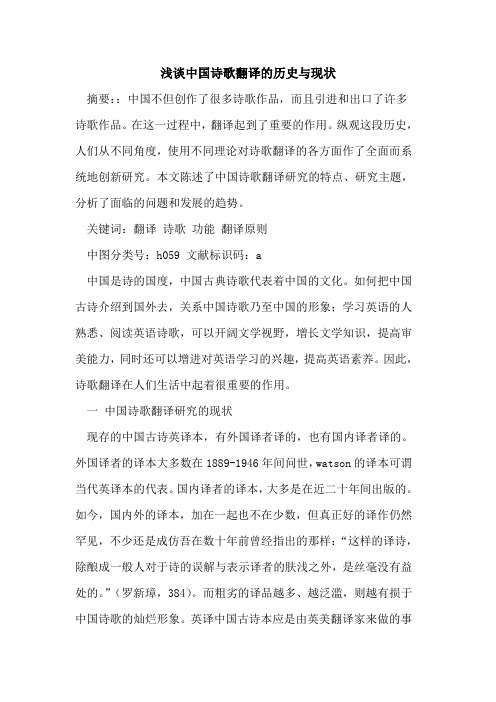
浅谈中国诗歌翻译的历史与现状摘要::中国不但创作了很多诗歌作品,而且引进和出口了许多诗歌作品。
在这一过程中,翻译起到了重要的作用。
纵观这段历史,人们从不同角度,使用不同理论对诗歌翻译的各方面作了全面而系统地创新研究。
本文陈述了中国诗歌翻译研究的特点、研究主题,分析了面临的问题和发展的趋势。
关键词:翻译诗歌功能翻译原则中图分类号:h059 文献标识码:a中国是诗的国度,中国古典诗歌代表着中国的文化。
如何把中国古诗介绍到国外去,关系中国诗歌乃至中国的形象;学习英语的人熟悉、阅读英语诗歌,可以开阔文学视野,增长文学知识,提高审美能力,同时还可以增进对英语学习的兴趣,提高英语素养。
因此,诗歌翻译在人们生活中起着很重要的作用。
一中国诗歌翻译研究的现状现存的中国古诗英译本,有外国译者译的,也有国内译者译的。
外国译者的译本大多数在1889-1946年间问世,watson的译本可谓当代英译本的代表。
国内译者的译本,大多是在近二十年间出版的。
如今,国内外的译本,加在一起也不在少数,但真正好的译作仍然罕见,不少还是成仿吾在数十年前曾经指出的那样:“这样的译诗,除酿成一般人对于诗的误解与表示译者的肤浅之外,是丝毫没有益处的。
”(罗新璋,384)。
而粗劣的译品越多、越泛滥,则越有损于中国诗歌的灿烂形象。
英译中国古诗本应是由英美翻译家来做的事情。
国内翻译家之所以从事这方面的研究和工作,主要原因是英译中国诗极难。
后来者有借鉴先行者的方便,watson的译作的确改正了不少过去译本中的“误译”。
然而,至少从现存译本来看,即使是出之国内译者之手,无论是对原文的理解,还是英语表达,也很难说一定超过外国译者,尤其是像herbert h.giles那样的早期译家。
换言之,尽管身为中国人,又可以借鉴外国人的译作,但并没有取得应有的进步,甚至还存在不少出于缺乏中国诗歌基本知识的误译。
中国翻译文学最早面世的是诗歌,在我国数千年的译介长河中,这个历史并不算太长,但诗歌翻译及其理论研究经历了从晚清和20世纪二三十年代的“幼年期”到80年代的“成年期”后,发展至今,无论是在翻译诗歌实践还是在理论研究方面,可谓百花竞放,成果颇丰。
精编张保红——文学翻译资料

3 A Hermit Visited but not Encountered
--- tr. Wan Changsheng & Wang Jianzhong
4 Looking for a Recluse but Failing to Find Him
--- tr. Burton Watson
张驼提盒去探亲, 李驼遇见问原因, 赵驼拍手哈哈笑, 世上原来无直人。
寻隐者不遇 贾岛
松下问童子, 言师采药去。 只在此山中, 云深不知处。
标题的翻译
1 A Note Left for an Absent Recluse
--- tr. Witter Bynner
2 A Call on the Recluse Who Is Just Out
3)现象学家英伽登的“五分法”:
①字音层:字音、字形等语义与审美意义。
②意义单位:句法结构都有它的意义单元。
③图式化方面:每一所写客体都是由诸多 方面构成,在文学作品中出现时只能写 出其某些方面。
④被再现客体:文学作品中所表达的人、 物、情、事等。
⑤形而上性质层:揭示生命和存在更深的 意义,如作品中所表现出的悲剧性、戏 剧等。
• 职业道德:“就是责任心,对自己负责,对他 人负责,对艺术负责。换言之,也就是要真实, 对自己真实,对他人真实,对艺术真实。”
• 扎实的双语语言功底:具有较强的驾驭译出语 和译入语的双语能力,具有较为出色的双语写 作技能,能正确理解原文,熟练运用双语。
• 广博的文化知识:相关国家的文化背景知识 (如历史、宗教、政治、地理、军事、外交 等),中西文化差异的知识以及翻译理论与翻 译研究相关学科的知识(如语言学、哲学、文 学、美学、心理学等)。
浅论对等视角下的法语诗歌翻译问题
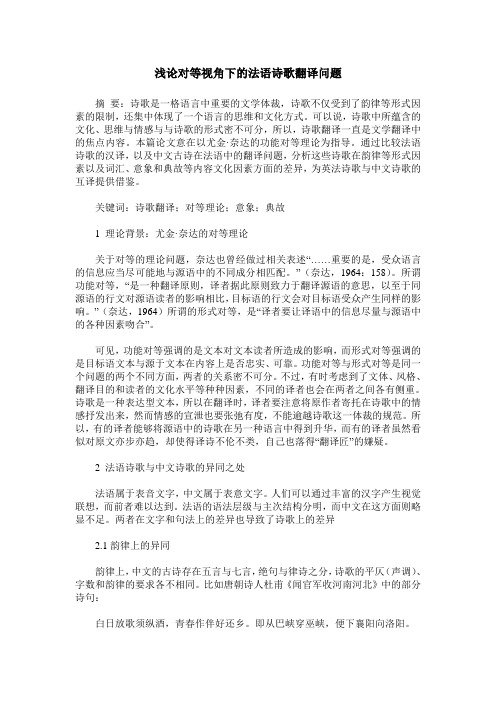
浅论对等视角下的法语诗歌翻译问题摘要:诗歌是一格语言中重要的文学体裁,诗歌不仅受到了韵律等形式因素的限制,还集中体现了一个语言的思维和文化方式。
可以说,诗歌中所蕴含的文化、思维与情感与与诗歌的形式密不可分,所以,诗歌翻译一直是文学翻译中的焦点内容。
本篇论文意在以尤金·奈达的功能对等理论为指导。
通过比较法语诗歌的汉译,以及中文古诗在法语中的翻译问题,分析这些诗歌在韵律等形式因素以及词汇、意象和典故等内容文化因素方面的差异,为英法诗歌与中文诗歌的互译提供借鉴。
关键词:诗歌翻译;对等理论;意象;典故1 理论背景:尤金·奈达的对等理论关于对等的理论问题,奈达也曾经做过相关表述“……重要的是,受众语言的信息应当尽可能地与源语中的不同成分相匹配。
”(奈达,1964:158)。
所谓功能对等,“是一种翻译原则,译者据此原则致力于翻译源语的意思,以至于同源语的行文对源语读者的影响相比,目标语的行文会对目标语受众产生同样的影响。
”(奈达,1964)所谓的形式对等,是“译者要让译语中的信息尽量与源语中的各种因素吻合”。
可见,功能对等强调的是文本对文本读者所造成的影响,而形式对等强调的是目标语文本与源于文本在内容上是否忠实、可靠。
功能对等与形式对等是同一个问题的两个不同方面,两者的关系密不可分。
不过,有时考虑到了文体、风格、翻译目的和读者的文化水平等种种因素,不同的译者也会在两者之间各有侧重。
诗歌是一种表达型文本,所以在翻译时,译者要注意将原作者寄托在诗歌中的情感抒发出来,然而情感的宣泄也要张弛有度,不能逾越诗歌这一体裁的规范。
所以,有的译者能够将源语中的诗歌在另一种语言中得到升华,而有的译者虽然看似对原文亦步亦趋,却使得译诗不伦不类,自己也落得“翻译匠”的嫌疑。
2 法语诗歌与中文诗歌的异同之处法语属于表音文字,中文属于表意文字。
人们可以通过丰富的汉字产生视觉联想,而前者难以达到。
法语的语法层级与主次结构分明,而中文在这方面则略显不足。
意象与汉诗英译_以陶渊明诗_归园田居_其一_英译为例

收稿日期:2004-09-27基金项目:中国地质大学(武汉)优秀青年教师基金项目(C UG QNW 0501)作者简介:张保红(1969-),男,湖北应城人,中国地质大学(武汉)外国语学院教授,硕士生导师,南开大学外国语学院博士生,研究方向为文学翻译与英美诗歌。
意象与汉诗英译———以陶渊明诗《归园田居》(其一)英译为例张保红(中国地质大学外国语学院,湖北武汉430074)摘 要:本文从语词意象、意象组合以及意象系统三个方面探讨了陶渊明诗《归园田居》(其一)的翻译问题,旨在阐明意象视角下的汉诗英译研究的特色与显在优势。
关键词:意象;汉诗;翻译中图分类号:H31519 文献标识码:A 文章编号:10022722X (2005)0420051208I magery and Ch i n ese 2English Poeti c Tran sl a ti on—W ith O nce M ore G a rdens and F ields (1)by Tao Y uanm i n g a s Exam pleZ HANG Bao 2hong(Foreign Languages College,China University of Geosciences,W uhan,Hubei Pr ov .,430074,China )Abstract:The p resent paper makes a tentative study of the English versi ons of the poe m O nce M ore Gardens and Fields (1)by the J in dynasty poet Tao Yuan m ing fr om pers pectives of a single i m age,a combinati on of i m ages and a syste m of i m ages,in order t o highlight the characteristics and advantages of the i m agery 2oriented study of the English versi ons of Chinese poetry .Key words:i m agery;Chinese poetry;translati on 0.引言意象是中西文艺理论与诗学中共用的一个概念。
张保红文学翻译作业6(小说EC)-原文

Nephew from TurkeyIlyas HalilOne day last year, there was a sudden knock on the door. Without warning, my nephew had arrived from Turkey! When I had last seen him, he was knee-high to a grasshopper, with timid eyes, ears like two fans, two front teeth missing, short hair and continually dirty hands. You know, the look that fits every nephew. I liked and was closely attached to him. With that knee-high-to-a-grasshopper size, he used to look up at me as if viewing a telephone pole, his amber eyes smiling and secretly making fun of me. The legs sticking out of his short pants were a little crooked. Though his eyes were straight, he appeared a bit cross-eyed. I felt sorry when I looked at him…and I never got angry with him or hit him. When we talked, he seemed to have a weight on his shoulders and appeared offended. When he was guilty, this attribute definitely worsened. His eyes grew moist and his voice softened to where he could hardly be heard; it trembled like a leaf. Those who saw him, thought him an orphan and felt sorry. They felt like putting their hands in their pockets and giving him some spending money or candy. In spite of my hitting my other nephews for any old thing, this one I cou ldn‟t touch. I loved the little son of a gun!At home, no matter who got angry, our nephew managed to keep his distance. If you spoke to him, he didn‟t reply. If he did answer, it was quietly. Even if you hit him, he was quiet. When taking a beating, instead of increasing, his wailing decreased. Thus, the anger of who ever was beating him turned to compassion and the boy was saved from further punishment. Only much later did I come to this conclusion. When talking with others I observed that our lad had neither crooked legs, cross-eyes nor big ears hanging like fig leaves. Furthermore, when he got mad, he knew how to yell his head off. It was only when he detected danger that his legs went crooked, his ears grew and his eyes crossed.I hadn‟t seen my nephew for the fifteen years since I had emigrated to Canada. He had become a strapping young man, handsome and strong! After bidding him welcome, I asked a few questions about what he planned to do.“What job will you take, Nephew?‟“Golly, Uncle, I‟ll do any jo b there is. Nothing will get away fro m me. Just say it, I‟ll do it.I‟ve done everything! I‟ve been a carpenter, electrician, peddler, shoemaker, tailor, auto mechanic; you want more? I‟ve been all of these!”“Too bad! So you didn‟t get the chance to go to college?”“What kind of talk is that, Uncle! I finished law school.”“Very well, my boy, but how did you find time to do all these things? You‟re only twenty-three years old! How did you manage all these jobs and still go to college?”“Uncle, don‟t worry about the details! Just eat the grapes and don‟t ask about the vineyard! If you don‟t believe me, show me a broken electric sewing machine, radio, electric shaver or a juicer and I‟ll repair it. You can‟t tell a suit I‟ve reversed the cloth on from a new o ne. If I turn that handkerchief pocket over it will look real sharp! It‟s not hard to sell old clothes for new! If it‟s food you want, let me cook for you today! See if what I cook isn‟t so delicious you can‟t eat enough of it? The flavor will stay on your palate a hundred years! There‟s nothing I don‟t know, Uncle!”I saw that our boy certainly had learned “to shoot the bull.” I‟ve heard of all types but never one like this. The boy was a walking trades guild! Furthermore, he had studied law! Be logical, I thought to myself. If a person spent two years learning each job, it would take fifty years to learn all these professions. “Something‟s rotten in Denmark.” It‟ll probably surface later!“What job can you get here? Forget law for now. The source of Canadi an law is not Roman law. Napoleonic Civil Law isn‟t in effect here, either, ” I told him.“Napoleonic Law? What‟s that? We didn‟t study such law.”“You mean you don‟t know who Napoleon was?”“No,” replied our nephew.“So-o-o, what kind of history did you s tudy?‟“Ordinary history, Uncle! Only we didn‟t have a history teacher. A captain came to our class, a history buff from the nearby regiment. He gave us lots of lessons on soldiering and the repair of weapons. Because of him, I became a Number One gunsmith. Bring whatever you want! Blindfolded, I can take apart a machine gun and assemble it again, I can even repair heavy tanks. If you want, I‟ll make you a pistol form a water pipe! I know lots about weapons. Our captain used to say, “After you know weapons,you make history yourself. There‟s no need to learn history someone else has made!” I don‟t know who defeated whom in battle nor what year. What do I care?Would that make me powerful? It‟s hot air! Nah! If this right arm is strong, OK, forget the rest!”“Very well, Nephew! Tomorrow, let‟s go to the capital and register you at the embassy.”“Are we going to Washington, Uncle?”“Come on, is Washington the capital of Canada?Who taught you geography, my boy?”“O-hoh, Uncle, look at the question you asked. Gee, in a lifetime, who is going to ask me the capital of Canada? Instead of that, I learned more useful things! If your coat gets torn today will knowledge about Canada save you expense? Or is knowledge of sewing needed? Tell me, Uncle! The things our geogr aphy teacher taught us are always useful. After our school‟s geography teacher, Omer Temel, left to open a grocery store, the town tailor, Kasim Effendi, who knew how to read and write, came to teach the geography class. He taught us for six years. We learned a lot! Every year, we turned the cloth on two suits of clothes. We patched and learned to press! We learned how to sew trousers. Our teacher said, “Learn this and in life you‟ll never go hungry. Instead of memorizing the names of infidel foreign cities, or learning their rivers, learn something useful! What‟s that knowledge good for except to climb mountains and tear up your shoes? For what God-awful reason do you learn the population of Berlin or London? Doesn‟t the number change every year? Not only every year, it changes every day, every hour! Thousands of people die, are born, come and go…Don‟t those geographers have any brains? They never get tired of giving false figures to the students.”“Tailor Kasim Effendi used to say, “Now see! Look at Haydar,the literature teacher‟s house, then mine! Tell me now, whose knowledge is the most useful? Haydar Bey writes poetry, but he‟s hungry; so what‟s the use of this knowledge? Come and see whose knowledge provides more bread, butter and honey. Come and see who lives more comfortably. Pay attention to what I say! Learn what I show you and you won‟t eat bread without butter and honey!”I listened to my nephew in amazement. What he said was probably true. I compared my situation with his. There was a chasm between us! I was a graduate history teacher, fifty-three years old. For the past fifteen years I‟ve continued at the university every winter learning new things. Every year, I realize how far behind I am! In spite of this, in the same place, like a donkey‟s tail, I teach on and on, hoping for better things! With this way of life it seems I‟m getting nowhere.“Very well, my boy, how‟s your mathematics?” I asked.“Hot as a pistol, Uncle. Not a thing wrong with it! We learned mathematics fr om its origin. Ther e was no one better than our teacher. If you searched all of Turkey, you truly couldn‟t find a better teacher. Mison came to us for math. He was the accountant for a big institution. He taught us how to count money, put the excess in the safe and to bargain.“He impressed on us the fine points of addition and subtraction. For example: when buying a product, addition is one thing when selling, something else. It‟s the same with subtraction! Not everyone knows these fine points. Mison is a man who gives the government the run-around. He prepares tax returns every year and it‟s impossible to find a mistake in them. The government offered him thousands of lira: …Come and be our Minister of Finance!‟He didn‟t accept. …I‟m just a servant to free principles!‟ he replied. Truly, he was a modest man. It‟s too bad we couldn‟t learn multiplication and division form him. But never mind, I‟ll handle the situation with addition and subtraction. Thank God, I haven‟t been cheated yet.”“All right, son, didn‟t you have diff iculty in college with such a two-bit education?‟“What difficulty, Uncle? The teachers had the difficulty from us. It was really easy for us. At this time I learned auto repair. In the second year of law, our professor of International Law was sick and di dn‟t come to class the whole year. During those class periods, I went to the garage across from the university and worked. I did auto repairs. American tourists used to bring their cars to the garage. So I learned foreign money and exchange in addition to improving my knowledge of English. That year I earned as much as a professor.”I was becoming more and more interested. This was a philosophy of education unfamiliar to me. They were educating students in an atmosphere conforming to the goings-on in the world.“OK, son, what did you learn carpentry in place of?‟“I didn‟t learn it in place of anything, Uncle! When our professor of Civil Law suddenly died at the beginning of the school year, I worked at a carpentry shop to fill my spare time. Uncle, I have no regrets that I learned this. I built our house. Foundation, walls, ceiling, furniture----I made everything. Too bad I didn‟t stay there longer.“Six months later, a teacher came to our college of Medicine, a specialist in internal medicine. From him, I p icked up many facts related to civil law. He‟d been in the College of Medicine when one of his teachers died; a professor of Civil Law then came to teach them. So that‟s how he learned a great deal about law. That year he also increased our knowledge of health. If someonegets sick at home, I understand their condition, more or less. I know how to administer aspirin and quinine. Working on cruise ships, I measured blood pressure for two seasons and made lots of money. I was just about to become a doctor!”M y nephew‟s treasury of knowledge knew no bounds. He had learned something about everything. In Canada, he worked on and off… He couldn‟t hold a job anywhere. Everything he did was third-rate, so they gave him the gate. One day, we found that he‟d packed up his stuff and returned to Turkey. According to our latest news, in one year the boy became a millionaire.We correspond. In every letter he says, “Work hard on your university courses, Ha!”The Lemon LadyKatitiWe called her the "Lemon Lady" because of the sour-puss face she always presented to the public and because she grew the finest lemons we had ever seen, on two huge trees in her front garden. We often wondered why she looked so sour and how she grew such lemons ----but we could find out nothing about her. She was an old lady----at least 70 years of age, at a guess, perhaps more.One day we answered an advertisement for a flat to rent, as we had been asked to leave ours as soon as we could, and when we went to the address given, it was the house of the Lemon Lady.She didn't "unfreeze" during the whole of our interview. She said the flat would not be ready for occupation for about a month; that she had 45 names on her list and might add more before it was ready and then she would just select the people to suit her best. She was not antagonistic, just firm and austere, and I gathered that we were not likely to be the ones selected.As my husband and I were leaving, I said, "How do you grow those wonderful lemons?" She gave a wintry smile, which transformed her whole expression and made her look sweet and somehow pitiful."I do grow nice lemons," she replied. We went on to tell her how much we had always admired them every time we had passed, and she opened up and told us quite a lot about this fruit.“You know the general theory of pruning, I suppose?" She asked."Oh," said my husband, "I understand about pruning fruit trees and roses, but you must not prune lemons, or so I understand." He added these last words when he saw from the Lemon Lady's expression that he had said the wrong thing."No," said the Lemon Lady, "you must not prune lemons unless you want them to grow like mine. What is the reason for pruning?""Well, to cut off dead or diseased wood; to prevent one branch chafing another; to let the sunlight into the center of the bush and to promote the growth of the more virile buds.""Very nicely put," said the Lemon Lady. "And why do you think that lemons are better with dead or diseased wood on them; why should you not let sunlight into them; why should allowing many sickly buds to develop make it a healthier tree?""I hadn't thought about it at all," confessed my husband rather shame-facedly, as he prides himself on being an original thinker, and here he was allowing an old lady to out-think him. "Everyone here said you mustn't prune lemons, so I thought it must be right."We thanked her for the information and left, on much better terms with her than we would have ever thought possible. We even felt quite a degree of affection towards her.In the course of the next three weeks we saw several places that might have been to let but which for various reasons we could not get. Eventually we got a place that suited us very well and I returned to tell the Lemon Lady that we would not be needing her flat.She was very nice and gave me afternoon tea. She said in her precise and careful style, "I'm glad you have a house for your own sake and for the sake of your little boy, because a flat is no place for a child, especially a boy. But for my own sake, I'm very sorry. I had decided to let you have the flat because I think we could have got on very well together and because you liked my lemons."As I left, she handed me a bag with two huge lemons in it. They were the most magnificent I have ever seen----huge and without blemish, and two were all the load I would care to carry. As I looked back from the gate and saw her sweet smile, I wondered why we had called her the Lemon Lady.As my husband said to me afterwards, "No one could do anything so well as she grew those lemons, without being very proud of the accomplishment, and our touching on them was a goodpoint in psychology." We have used that idea to good effect several times since then.At the house we did rent was a decayed, dying old lemon tree with the woodlice playing havoc with the remnant of its body. My husband shook his head sadly as he gazed at it. "Too late for treatment, I'm afraid," he said, but he set to and pruned it ruthlessly. We were in that house for four years and from the second year onward, we each had the juice of a lemon every morning, and when we left we took with us two 60-pound cases of lemons from the tree, and after we left a friend wrote and asked why we had not picked the lemons before we left.We still call her the Lemon Lady, but the term is now one of pure affection.Hate(Excerpt)Hendrik Willem Van LoonSuddenly the war was over, and Hitler was captured and brought to Amsterdam. A military tribunal condemned him to death. But how should he die? To shoot or hang him seemed too quick, too merciful. Then someone uttered what was in everybody's mind: the man who had caused such incredible suffering should be burned to death."But," objected one judge, "our biggest public square in Amsterdam holds only 10,000 people, and 7,000,000 Dutch men, women and children will want to be there to curse him during his dying moments."Then another judge had an idea. Hitler should be burned at the stake, but the wood was to be ignited by the explosion of a handful of gunpowder set off by a long fuse which should start in Rotterdam and follow the main road to Amsterdam by way of Delft, The Hague, Leiden and Haarlem. Thus millions of people crowding the wide avenues which connect those cities could watch the fuse burn its way northward to Herr Hitler's funeral pyre.A plebiscite was taken as to whether this was a fitting punishment. There was 4,981,076 yeas and one nay. The nay was voted by a man who preferred that Hitler be pulled to pieces by four horses.At last the great day came. The ceremony commenced at four o'clock on a June morning. The mother of three sons who had been shot by the Nazis for an act of sabotage they did not commit set fire to the fuse while a choir sang a solemn hymn of gratitude. Then the people burst forth into a shout of triumph.The spark slowly made its way from Rotterdam to Delft, and on toward the great square in Amsterdam. People had come from every part of the country. Special seats had been provided for the aged and the lame and the relatives of murdered hostage.Hitler, clad in a long yellow shirt, had been chained to the stake. He preserved a stoical silence until a little boy climbed upon the pile of wood surrounding the former Fuhrer and placed there a placard which read, "This is the world's greatest murderer." This so aggravated Hitler's pent-up feelings that he burst into one of his old harangues.The crowd gaped, for it was a grotesque sight to see this little man ranting away just as if he were addressing his followers. Then a terrific howl of derision silenced him.Now came the great moment of the day. About three o'clock in the afternoon the spark reached the outskirts of Amsterdam. Suddenly there was a roll of drums. Then, with an emotion such as they had never experienced before, the people sang the Wilhelmus, the national anthem. Hitler, now ashen-gray, futilely strained at his chains.When the Wilhelmus came to an end, the spark was only a few feet from the gunpowder; five more minutes, Hitler would die a horrible death. The crowd broke forth to a shout of hate. A minute went by. Another minute. Silence returned. Now the fuse had only a few inches to go. And at that moment the incredible happened.A wizened little man wriggled through the line of soldiers standing guard. Everybody knew who he was. Two of his sons had been machine-gunned to death by parachute troops; his wife and three daughters had perished in Rotterdam's holocaust. Since then, the poor fellow had seemed deprived of reason, wandering aimlessly about and supported by public charity—an object of universal pity.But what he did now made the crowd turn white with anger. For he deliberately stamped upon the fuse and put it out."Kill him! Kill him!" the mob shouted. But the old man quietly faced the menacing populace. Slowly he lifted both arms toward heaven. Then in a voice charged with fury, he said:"Now let us do it all over again!"因为有了那个信箱林荣芝近来小镇治安有点乱。
文学翻译的美学效果
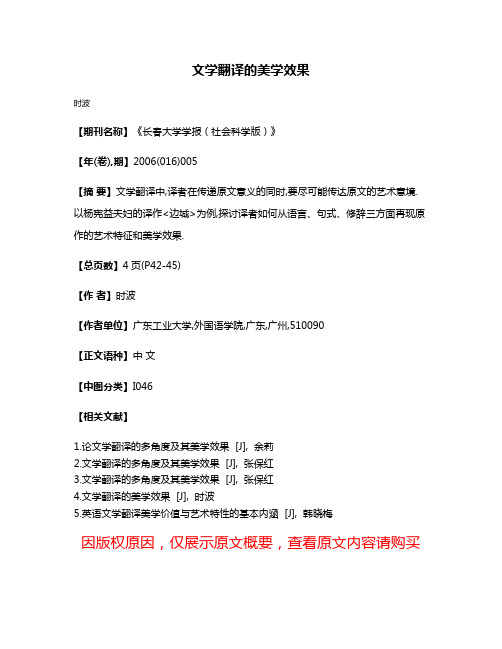
文学翻译的美学效果
时波
【期刊名称】《长春大学学报(社会科学版)》
【年(卷),期】2006(016)005
【摘要】文学翻译中,译者在传递原文意义的同时,要尽可能传达原文的艺术意境.以杨宪益夫妇的译作<边城>为例,探讨译者如何从语言、句式、修辞三方面再现原作的艺术特征和美学效果.
【总页数】4页(P42-45)
【作者】时波
【作者单位】广东工业大学,外国语学院,广东,广州,510090
【正文语种】中文
【中图分类】I046
【相关文献】
1.论文学翻译的多角度及其美学效果 [J], 余莉
2.文学翻译的多角度及其美学效果 [J], 张保红
3.文学翻译的多角度及其美学效果 [J], 张保红
4.文学翻译的美学效果 [J], 时波
5.英语文学翻译美学价值与艺术特性的基本内涵 [J], 韩晓梅
因版权原因,仅展示原文概要,查看原文内容请购买。
韦利中国古典诗词直译探析
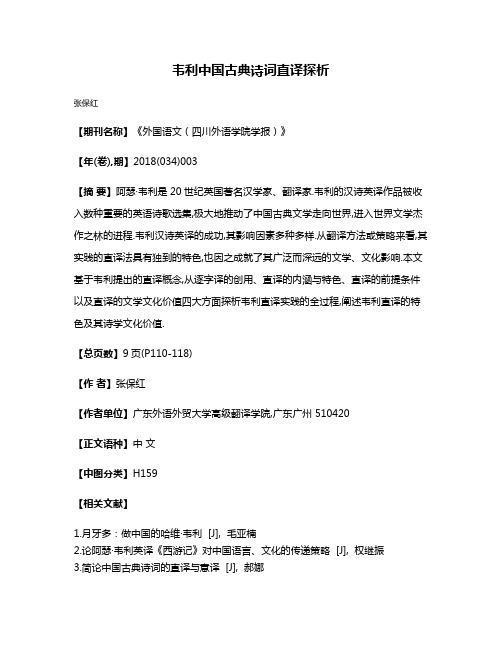
韦利中国古典诗词直译探析
张保红
【期刊名称】《外国语文(四川外语学院学报)》
【年(卷),期】2018(034)003
【摘要】阿瑟·韦利是20世纪英国著名汉学家、翻译家.韦利的汉诗英译作品被收入数种重要的英语诗歌选集,极大地推动了中国古典文学走向世界,进入世界文学杰作之林的进程.韦利汉诗英译的成功,其影响因素多种多样.从翻译方法或策略来看,其实践的直译法具有独到的特色,也因之成就了其广泛而深远的文学、文化影响.本文基于韦利提出的直译概念,从逐字译的创用、直译的内涵与特色、直译的前提条件以及直译的文学文化价值四大方面探析韦利直译实践的全过程,阐述韦利直译的特色及其诗学文化价值.
【总页数】9页(P110-118)
【作者】张保红
【作者单位】广东外语外贸大学高级翻译学院,广东广州 510420
【正文语种】中文
【中图分类】H159
【相关文献】
1.月牙多:做中国的哈维·韦利 [J], 毛亚楠
2.论阿瑟·韦利英译《西游记》对中国语言、文化的传递策略 [J], 权继振
3.简论中国古典诗词的直译与意译 [J], 郝娜
4.阿瑟·韦利的中国绘画研究与汉学转折 [J], 曹顺庆;任鑫
5.生态翻译视角下中国文化负载词的英译研究——基于亚瑟·韦利《论语》译本 [J], 胡迪
因版权原因,仅展示原文概要,查看原文内容请购买。
画译:20世纪美国诗人汉诗英译新视角
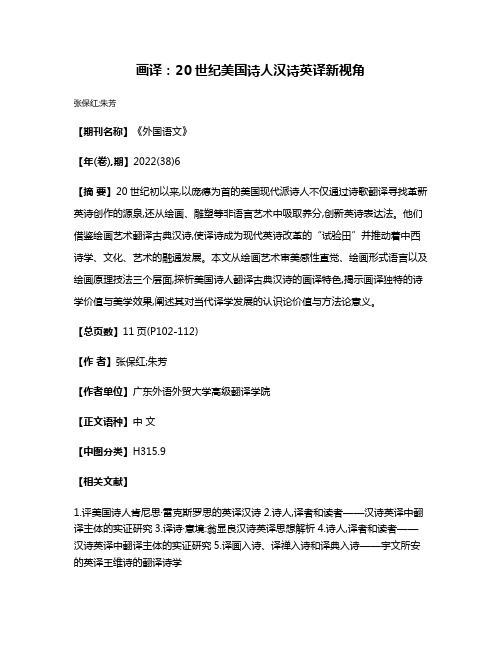
画译:20世纪美国诗人汉诗英译新视角
张保红;朱芳
【期刊名称】《外国语文》
【年(卷),期】2022(38)6
【摘要】20世纪初以来,以庞德为首的美国现代派诗人不仅通过诗歌翻译寻找革新英诗创作的源泉,还从绘画、雕塑等非语言艺术中吸取养分,创新英诗表达法。
他们借鉴绘画艺术翻译古典汉诗,使译诗成为现代英诗改革的“试验田”并推动着中西诗学、文化、艺术的融通发展。
本文从绘画艺术审美感性直觉、绘画形式语言以及绘画原理技法三个层面,探析美国诗人翻译古典汉诗的画译特色,揭示画译独特的诗学价值与美学效果,阐述其对当代译学发展的认识论价值与方法论意义。
【总页数】11页(P102-112)
【作者】张保红;朱芳
【作者单位】广东外语外贸大学高级翻译学院
【正文语种】中文
【中图分类】H315.9
【相关文献】
1.评美国诗人肯尼思·雷克斯罗思的英译汉诗
2.诗人,译者和读者——汉诗英译中翻译主体的实证研究
3.译诗·意境:翁显良汉诗英译思想解析
4.诗人,译者和读者——汉诗英译中翻译主体的实证研究
5.译画入诗、译禅入诗和译典入诗——宇文所安的英译王维诗的翻译诗学
因版权原因,仅展示原文概要,查看原文内容请购买。
- 1、下载文档前请自行甄别文档内容的完整性,平台不提供额外的编辑、内容补充、找答案等附加服务。
- 2、"仅部分预览"的文档,不可在线预览部分如存在完整性等问题,可反馈申请退款(可完整预览的文档不适用该条件!)。
- 3、如文档侵犯您的权益,请联系客服反馈,我们会尽快为您处理(人工客服工作时间:9:00-18:30)。
《英语世界》2012(2):4-6
• 主要内容 1 文学语言的基本特性 2 文本层次论与翻译研究 3 文学译者的素质要求 4 文学翻译的原则 5 译例演示
一 文学语言的基本特性
指义性 VS 审美性
1 外部指涉性(他指性)VS 自我指涉性(自指性)
2 直接指涉性(直指性)VS 间接指涉性(曲指性)
3 真实指涉性(真值性语言话语突出和显示自身。其表现在:
--语音:日常语言注重意思的表达,发音 是否悦耳动听,节奏是否抑扬顿挫等就 顺其自然、比较随便;文学语言关注发 音谐拗、节奏疾徐、韵律有无等。
--语法:文学语言往往会偏离日常语言语 法规范,如语序调整,词性变换等。
2.文学语言的曲指性:
采用曲折迂回手法表达意思
--原因:作者的表意策略;形象指涉的内 容具有某种不可穷尽性特点;读者想象 与回味的审美要求。
--表现:各种修辞手段或含蓄手法。
--结果:“言有尽而意无穷” “言在此而 意在彼” “不着一字,尽得风流”。
--目的:强化和深化审美效果和艺术感染 力。
三驼图(明)李士达
--- tr. Sun Dayu
3 A Hermit Visited but not Encountered
--- tr. Wan Changsheng & Wang Jianzhong
4 Looking for a Recluse but Failing to Find Him
--- tr. Burton Watson
文学翻译工作者戒 (译事十戒;译事十法) 《英语世界》2012(3):4-6
2)文学翻译由来已久,而且现在的本科翻 译专业基本上走的都是文学翻译的老路 子,……,仍然重复文学翻译的课程设 置,…… 《中国翻译》2012(1):26 (文学翻译“假想
敌”)
3)用文学翻译的例子研究了普适性的翻译 问题;文学翻译是基础、训练、修养与 提高。
sleeps.
• 轻轻地,柔和地 阿尔弗雷德·丁尼生
轻轻地,柔和地,轻轻地,柔和地, 西方吹来海风; 轻轻地,柔和地吹拂, 西方吹来海风! 西边吹来,月色朦胧, 吹过波涛汹涌; 吹得他回家呵, 亲亲睡着的宝宝,可爱的宝贝。
• 重译:
• 西海的风啊, • 你轻轻地吹,轻轻地唱 • 西海的风啊, • 你轻轻地,轻轻地吹呀唱, • 越过波涛翻滚的海洋, • 掠过明月西沉的夜空,吹呀 • 再把他吹到我的身旁; • 我的小宝宝,我的乖宝宝,睡呀睡得香。
目的:增强语言的审美效果,激发读者审
美感知和审美情感。
Sweet and Low Alfred Tennyson
• Sweet and low, sweet and low, • Wind of the western sea, • Low, low, breathe and blow, • Wind of the western sea! • Over the rolling waters go, • Come from the dying moon, and blow, • Blow him again to me; • While my little one, while my pretty one,
5 An Unsuccessful Visit to an Absent Recluse
--- tr. Wang Dalian
• 译文1:留下便条给隐者, • 译文2:拜访, • 译文3:隐者, • 译文4:行为过程, • 译文5:寻访失败。
张驼提盒去探亲, 李驼遇见问原因, 赵驼拍手哈哈笑, 世上原来无直人。
寻隐者不遇 贾岛
松下问童子, 言师采药去。 只在此山中, 云深不知处。
标题的翻译
1 A Note Left for an Absent Recluse
--- tr. Witter Bynner
2 A Call on the Recluse Who Is Just Out
Literary Translation
广东外语外贸大学高级翻译学院
张保红
2012.05.
• 引言:
1)谈翻译的书,特别是谈文学翻译的书, 一般有两大类:一类是纯粹探讨翻译理 论的书,搞翻译的人大都不看,看也看 不下去;一类是单纯探讨翻译技巧的书, 这类书有些是不怎么做翻译的人“研究” 出来的,不是隔靴搔痒,也多是纸上谈 兵,所谓的实用指南并不能用到实践中 去。
• 译文: 一个刚从学校回来的年轻女士正 在解释。“拿一个鸡蛋,”她说, “在底部打一个孔,在顶点上打 一个相应的孔。然后把嘴唇放在 孔上,用力吸气,蛋壳里的东西 就会完全抽空了。”一个听她讲 的老妇人惊叫道:“如今的人做 事真奇怪,我作小孩的时候,他 们一头打个洞,就吸干了。”
• 译文: 一位刚从学校回家的女学生正在解 释:“取一枚鸡蛋,”她说,“在 蛋的底部打一个小孔,再在蛋的顶 点上打一个对应的小孔。然后将嘴 唇置于该孔之上并用力吸气,壳内 之物则尽释无遗。”一位听她讲话 的老太太嚷了起来:“如今的人做 事真叫人摸不着头脑,我作姑娘的 那阵儿,人们把蛋一头磕一个洞, 嘶溜儿一嘬就吃了。”
A young lady home from school was explaining. “Take an egg,”she said, “and make a perforation in the base and a corresponding one in the apex, then apply the lips to the aperture, and by forcibly inhaling the breath, the shell is entirely discharged of its contents.” An old lady who was listening exclaimed: “It beats all how folks do things nowadays. When I was a gal, they made a hole in each end and sucked.”
